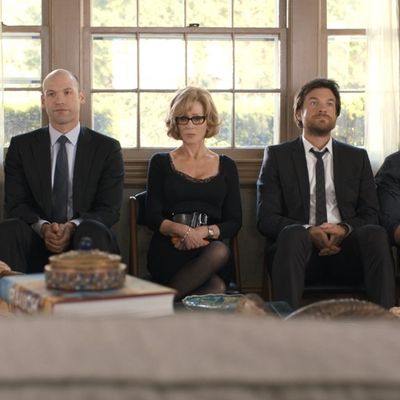
The awkwardly titled This Is Where I Leave You is a homecoming funeral comedy in which grown half-Jewish siblings spend more time quarreling and cracking wise than mourning the deceased, and all the characters have diarrhea of the mouth. Broadly directed by Shawn Levy from a script by Jonathan Tropper (based on his novel), it’s in your face and then some. But the actors expelling the wisecracks are ones you’ll probably enjoy spending time with, and the movie has some honest laughs if you can ignore the mixture of sentimentality and gross insensitivity.
A bearded Jason Bateman plays the more or less straight man, Judd Altman, a radio producer who walks in on his wife, Quinn (Abigail Spencer), boning his boss. When he travels home to visit his dying father, he doesn’t want to tell anyone that he and Quinn have parted ways, so he goofily lies about her absence. His father, alas, is dead when Judd gets to the hospital, and there’s some bitchy banter and slapstick business over tubes in the body. I was — sadly — in a hospital room under similar circumstances six months ago, and I don’t remember the occasion lending itself to yucks. Maybe I should have recused myself from writing this review. Or maybe I should just loosen up and get over it. This is a black comedy, right?
Closest to Judd among his siblings is the brainy Wendy, played by Tina Fey, whose husband is one of those yuppie stereotypes who takes phone calls during burials. Fey, though, is good: The comedienne never upstages the actress but is all there in the timing. The uptight brother is played by Corey Stoll, whose wife — desperate to have a baby — is the ever-underused Kathryn Hahn. Adam Driver plays the hapless child-man brother, whose new squeeze is his former analyst (Connie Britton). Their mom, Hillary, who acts a little like the Hillary, is played by Jane Fonda. As a film critic, I spend a lot of time lamenting bad plastic surgery on actors and (especially) actresses who feel driven to deform themselves — and sever facial muscles they really need — in the name of ageist, unattainable Hollywood standards. But there are exceptions to every rule, and damn if Fonda’s work isn’t excellent. Her face seems no tighter than it has in the last two decades, and she has that Fonda jawline back.
Fonda’s Hillary is a novelist who, over the course of her career, revealed every aspect of her children’s private lives. (“Secrets are bad for a family!”) Now she tells her kids that their father asked them to sit shiva for a full week, and when they try to argue her down, she says, “Your father’s dying wish, and you’re negotiating? You are all grounded!” I really liked that exchange. Kids and parents fall back into old roles easily, and this is an example of Tropper’s heavy hand hitting home. Less believable is Fonda’s breakfast declaration to her kids about their father’s assets: “Your father was hung!” Maybe it needed a better setup.
The town’s single gal (who carries a torch for Judd) is the beauteous Rose Byrne, the most improbable wasting-away single gal in movies. But oh, I wanted to believe. Her Penny Moore is a screwball motormouth who adds, at the end of a monologue, “I’m not a fan of small talk, so …” She’s delish. Wendy’s old heartthrob, meanwhile, is the hunk across the street played by Timothy Olyphant. The man had a grave brain injury, which put the kibosh on their life together, but the longing remains. Over the course of his career, Olyphant has given life to head-slappingly bad material, and he does it again by simply underplaying.
This Is Where I Leave You might have worked with a more glancing touch. Exchanges like, “Do you ever think before you speak?” “No, that would take all the fun out of it!” are better than they sound in this context, and the actors — especially Driver, who finds a new way to be offbeat in every role, and Britton, who suggests her character’s embarrassment in every casual intake of breath — give it their all Tropper’s underlying truth is that the death of a parent can, in a single stroke, call all the uncalled questions and rearrange the family ecosystem. Somewhere in this mess, there might be a very good movie.


